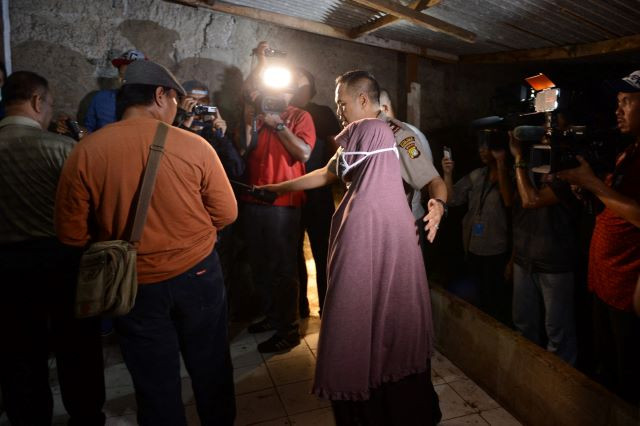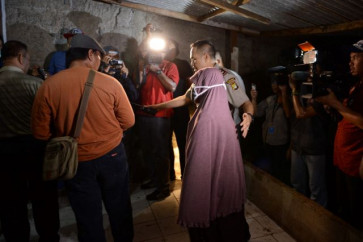Popular Reads
Top Results
Can't find what you're looking for?
View all search resultsPopular Reads
Top Results
Can't find what you're looking for?
View all search resultsDeradicalizing ‘potential’ radicals: The families of terrorists
Every radical has an equal chance of escalating into a terrorist, as being a terrorist is regarded as the final self-actualization of the radicalization journey.
Change text size
Gift Premium Articles
to Anyone
 Family ties: A police officer escorts Maisaroh (center, in hijab), the widow of the late terrorist suspect Muhammad Ali, during a search on Jan. 15, 2016 at his residence in Jakarta. Ali was killed the day before in a coordinated bomb attack, for which Islamic State claimed responsibility. (AFP/Romeo Gacad)
Family ties: A police officer escorts Maisaroh (center, in hijab), the widow of the late terrorist suspect Muhammad Ali, during a search on Jan. 15, 2016 at his residence in Jakarta. Ali was killed the day before in a coordinated bomb attack, for which Islamic State claimed responsibility. (AFP/Romeo Gacad)
T
hroughout the series of terrorist attacks in Indonesia from the 2002 and 2005 Bali blasts to the Astana Anyar police station suicide bombing in Cirebon, West Java, in 2022 we have seen how the government has striven to combat terrorism with an impressive rule-of-law and human rights-based approach that includes criminalizing and deradicalizing the perpetrators.
However, while Indonesia’s counterterrorism measures put a great focus on eroding the movement of terrorists by putting direct violent extremist offenders (VEOs) into jail and rehabilitation facilities, one interesting question remains unanswered: Do their families, their spouses, children, and parents, need to be deradicalized too?
This concern springs from a basic conjecture that community plays an important role in knitting someone’s ideology, and it is just a matter of logical consequence that someone can be a terrorist because of the stringent religious radicalism imbibed from his or her closest social circle.
Therefore, there is a fair probability that the family of a terrorist might also have been exposed to radicalism, but nevertheless, they are not yet defined as “terrorists” since there has not been any intention to resort to extreme attacks.
However, considering the maxim “not all radicals are terrorists, but all terrorists are radicals" somewhat reminds us that every radical has an equal chance to escalate into a terrorist, as being a terrorist is regarded as the final self-actualization of the radicalization journey. If this assumption is true, then there is always an imminent possibility for a terrorist’s family to one day evolve into a future terrorist.
In almost all terrorism cases by male convicts, the wives were just considered "supporters". In hindsight, this seems to be fair, since most of the spouses admitted in the sworn police investigation reports that they were only following their husbands’ instructions. Nevertheless, while the men terrorists are incarcerated, the police counterterrorism squad Densus 88 and the National Counterterrorism Agency (BNPT) will monitor the wives and children of a terrorist using a friendly approach such as providing basic needs and allowances, and involving government-affiliated Islamic institutions as part of deradicalization efforts.
However, there is no arbitrary policy that can force the wives and children to follow Densus 88 and the BNPT’s Islamic centers or other recommendations. At the end of the day, it is still up to them to decide how to live their lives. Moreover, the “potential” involvement of other family members is sometimes overlooked when unearthing terrorist activities.


















